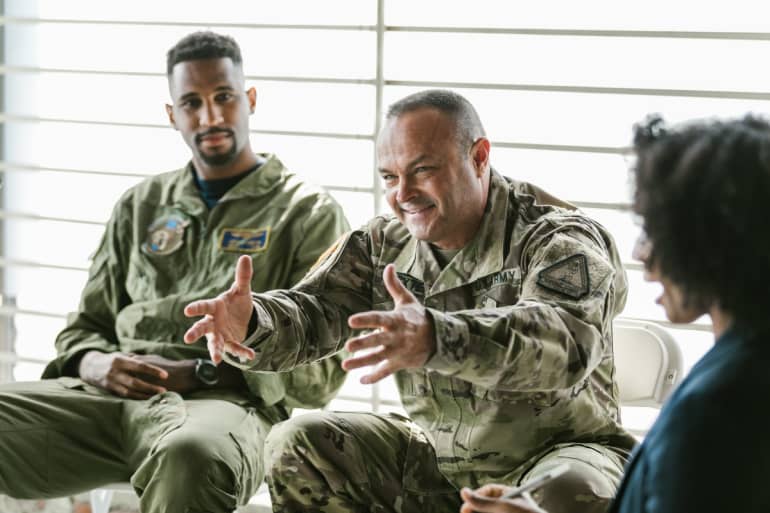Military life has a profound effect not just on active service members but on their families as well. For veterans transitioning to civilian life, navigating mental health challenges, trauma, post-traumatic stress disorder (PTSD), and more are all essential. Educated, caring support is necessary to challenge these difficulties while maintaining a healthy and sober civilian life. However, families and supports of veteran loved ones still have their own needs, and providing continuous support can sometimes lead to compassion fatigue. Overcoming compassion fatigue is not only necessary to best support veterans but also to ensure that families and loved ones are still tending to their own needs and goals.
What Is Compassion Fatigue?
Providing consistent support for veteran loved ones comes at a cost. This support is essential and genuinely transformational for veterans navigating the challenges of veteran life, especially in overcoming the continued effects of trauma or the prevalence of substance use disorder (SUD). Nevertheless, providing this support can be both physically and mentally exhausting, possibly resulting in “compassion fatigue.”

Compassion fatigue is the physical and emotional toll that supporting others takes on an individual. Moreover, it can leave an individual without the physical or mental energy to care for themselves. Some of the common symptoms of compassion fatigue for those supporting veteran loved ones include:
- Loss of interest in personal hobbies
- Inability to focus on personal needs
- Reduced feelings of empathy
- Anger or resentment toward loved ones receiving care
- Feeling detached from loved ones or out of control of daily life
- A perpetual feeling of physical or emotional exhaustion
- Compromised self-care outlets
- Feelings of burnout
It is also common for supports to feel as if their continued efforts to promote the healing of veteran loved ones are fruitless. Combined with helping veterans process their own traumatic experiences, emotional exhaustion and fatigue are common, with the secondary stress from hearing about traumatic experiences taking a further toll.
Overcoming compassion fatigue can be exceptionally complicated, and many supports may feel conflicted in taking charge of their own health or setting boundaries with veterans who may rely on such daily support. However, it is important to prioritize supports’ personal health to combat feelings of compassion fatigue, promote a healthier daily life for oneself, and provide more effective care to veteran loved ones.

Crystal meth withdrawal is one of the biggest reasons people avoid getting clean. Learn more about the symptoms of meth withdrawals and how to get help.
More infoStrategies for Overcoming Compassion Fatigue
There is no one, single, “best” way to address compassion fatigue. Thus, supports may have to explore various outlets to process feelings of emotional and physical exhaustion while tending to personal interests. It can be helpful to know that there are always new strategies to explore. Combining personal efforts with familial treatment and care available at Hawaii Island Recovery can empower supports of veterans to tend to their own needs as much as they selflessly support others.
Engage in Self-Care
Self-care plays a crucial role in helping to address feelings and symptoms of compassion fatigue. However, it can also be one of the first things compromised as an individual dedicates more and more of their time and energy to caring for veteran loved ones. Prioritizing self-care strategies and ensuring that each person is taking time for themselves every day is crucial. This means creating new schedules with dedicated time to engage in hobbies or personal interests.
However, this also includes time to both physically and emotionally rest. Providing around-the-clock support is exhausting, and self-care can also be time to step back and relax. Watching a relaxing television show, reading a book, and having a set bedtime to rest are all crucial for letting the mind and body truly replenish their energy and focus. Further, seeing one’s own self-care as essential to proper support is necessary for overcoming compassion fatigue.
Set Boundaries
While it can be difficult to allow oneself to set boundaries with veteran loved ones who may benefit from a person’s care, it is also essential. Setting boundaries such as having dedicated times when veteran loved ones may need to seek aid from other supports or practice tending to their own needs and goals can all be essential. Furthermore, allowing oneself to have boundaries and not feel guilty about setting such boundaries is crucial.
For some, this can involve physical boundaries, where an individual may have their own space. Others may employ certain times when they will not be by their phone, especially during self-care activities, work, or tending to social needs. Working with both veteran loved ones and the professionals at Hawaii Island Recovery to set these boundaries can all help to ensure that these boundaries are set, understood, and respected.

Burnout and fatigue can threaten your sobriety in a number of ways. Learn to combat the effects of burnout by calling Hawaii Island Recovery at (866) 390-5070.
More infoFind Support
There is nothing easy about caring for veteran loved ones, and military families as a whole face many challenges both while loved ones are deployed and during their transition to civilian life. Rehab in Hawaii can help supports find local support groups for families of veterans while challenging feelings of isolation and fatigue.
Local community meetings and gatherings, online support groups, and the communities available through Hawaii Island Recovery can all introduce supports to others in similar situations. This can empower supports to explore new strategies for overcoming compassion fatigue, tend to their own needs, and process feelings of anxiety, depression, and stress for a healthy familial life.
Compassion fatigue can be exceptionally difficult to overcome for those caring for veteran loved ones. At Hawaii Island Recovery, we understand the need to treat all members of military families, from those who have put their lives on the line in military service to the ones who care for veterans at home. Our unique approach to rehab in Hawaii allows us to create personalized treatment programs for veterans and their families, creating a community focused on holistic healing, comprehensive family strategies, and even spiritual healing for a unified and effective approach to a healthy and fulfilling civilian life. For more information on how we can help you, call to speak to a caring, trained staff member today at (866) 390-5070.
 Hawaii Island Recovery
Hawaii Island Recovery 










